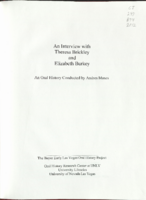Search the Special Collections and Archives Portal
Search Results

Transcript of interview with Bernard Lee Brown by Marcus Brown, February 27, 1979
Date
1979-02-27
Archival Collection
Description
Marcus Brown interviews his father, Bernard Lee Brown (born 1915 in New Albany, Indiana) about his experiences living in Las Vegas, Nevada. Bernard discusses his work at various gaming properties on the Strip and in Downtown Las Vegas, owning his own shoe business, working at the Nevada Test Site, racial discrimination, the role of unions, and overall changes in Las Vegas over time.
Text

Transcript of interview with Theresa Brickley and Liz Burkey by Andres Moses, January 27, 2006
Date
2006-01-27
Archival Collection
Description
Theresa Brickley and Elizabeth Burkey come from very different corners of the world, but were united by dance in Las Vegas. Theresa was bom and raised in Tokyo, and immigrated to the United States with her American husband. Elizabeth, better known as Liz, was bom in Detroit, Michigan into a family of performance artists. Theresa's first dance job was disrupted by World War II, while Liz's break came when becoming a Rockette at Radio City Music Hall. Migrating to Las Vegas from Seattle and California respectively, the two met as performers in the Sun City Dance Company, and became the best of friends. They have performed all over the city, including Sahara, Rio, and Mirage, to name a few.
Text

Transcript of Jim Gans by Claytee D. White, January 20, 2013
Date
2013-01-30
Archival Collection
Description
The Gans family moved to Las Vegas in 1950 to help alleviate Jim’s mother’s sinus condition and to provide better opportunities for his father who was in the refrigeration and air conditioning field. Jim started in school at Bonanza Elementary, then to a new Hyde Park Junior High where he was part of the first class and on to Rancho High School. Jim was always a hard worker. His first jobs were mowing lawns, a paper route, and working at a dog boarding kennel for 25-cents an hour. He learned early on that hard work and saving money would always pay off. His interests were varied including becoming a certified instructor for the Red Cross and serving on their Safety Committee. He led the Sierra Club as their Outing Chairman and spent a lot of time hiking. After graduation from high school he attended Nevada Southern University on and off because he also had to work, it took him six years to graduate. During this time, he became a member of the IBEW Union and helped build the Science and Technology Building and the Dickinson Library on campus. He then went to work for the Environmental Agency, also on campus. After that, he worked for the Titanium Metal Corporation in Henderson, NV. Always interested in flying, he went to Reno and attended the Aviation academy, got his license and stayed on for a while as an instructor. He and his wife, who he met at NSU, came back to Las Vegas where he worked for Central Telephone Co. and then Southwest Gas Company. His career path took a positive turn when he was hired by the Las Vegas Valley Water district and then transferred to the Clark County Sanitation District. He headed up an environmental planning department that culminated in a new, advanced waste water treatment plan and management system. In 1982, Jim went back to UNLV and got a MA in public administration. He spent 25 years with the Sanitation Department, 20 of those years as the General Manager. In 1999, Jim’s good friend Manny Cortez convinced him he needed a change and offered him a job at the Las Vegas Convention and Visitors Authority. He took the job and worked there until he retired. Jim spends many hours in various volunteer endeavors. One is PAYBAC (Professionals and Youth Building a Commitment) where he goes to various middle schools and talks to the students about the importance of education. For Jim Gans, retired is a relative term. The Gans family moved to Las Vegas in 1950 to help alleviate his mother’s sinus condition and also better opportunities for his father who was in the refrigeration and air conditioning field. Jim started in school at Bonanza Elementary, then to a new Hyde Park Junior High where he was part of the first class and on the Rancho High School. Jim was always a hard worker. His first jobs were mowing lawns, a paper route, and working at a dog boarding kennel for .25 an hour. He learned early on that hard work and saving money would always pay off. His interests were varied including becoming a certified instructor for the Red Cross and serving on their Safety Committee. He led the Sierra Club as their Outing Chairman and spent a lot of time hiking. After graduation from high school he attended Nevada Southern University on and off because he also had to work, it took him six years to graduate. During this time, he became a member of the IBEW Union and helped build the Science and Technology Building and the Dickinson Library on campus. He then went to work for the Environmental Agency also on campus. After that, he worked for the Titanium Metal Corporation in Henderson, NV. Always interested in flying, he went to Reno and attended the Aviation academy, got his license and stayed on for a while as an instructor. He and his wife, who he met at NSU, came back to Las Vegas where he worked for Central Telephone Co. and then Southwest Gas Company. His career path took a positive turn when he was hired by the Las Vegas Valley Water district and then transferred to the Clark County Sanitation District. He headed up an environmental planning department that culminated in a new, advanced waste water treatment plan and management system. In 1982, Jim went back to UNLV and got a MA in public administration. He spent 25 years with the Sanitation Department, 20 of those years as the General Manager. In 1999, Jim’s good friend Manny Cortez convinced him he needed a change and offered him a job at the Las Vegas Convention and Visitors Authority. He took the job and worked there until he retired. Jim spends many hours in various volunteer endeavors. One is PAYBAC (Professionals and Youth Building a Commitment) where he goes to various middle schools and talks to the students about the importance of education. For Jim Gans, retired is a relative term.
Text

Transcript of interview with John E. Craddock by Melody Craddock, April 10, 1977
Date
1977-04-10
Archival Collection
Description
On April 10, 1977, Melody Craddock interviewed her father, Dr. John E. Craddock (b. 1922 in San Diego, California), at their home about his experiences while living in Las Vegas, Nevada. Also present during the interview is Nancy Craddock, Melody’s mother, and George Apfel, Melody’s boyfriend. John, who was a dentist in the Navy, describes how Las Vegas was when he first arrived to the city in 1952. The three also discuss the development of the nearby Twin Lakes and Lorenzi Park, John’s personal experiences in witnessing the effects of the atomic testing, and the family’s experiences during trips to the nearby mines. John also talks about hunting in different parts of the state and finalizes the interview by describing the development of the different local airports.
Text

Transcript of interview with Patricia Carmichael Craddock by Joe Schneider, March 2, 1980
Date
1980-03-02
Archival Collection
Description
On March 2, 1980, Joe Schneider interviewed Patricia “Pat” Craddock (born 1928 in Las Vegas, Nevada) in her home about her experiences in Las Vegas, Nevada. Pat first talks about growing up in Las Vegas, where she became a teacher, and her eventual travels to live in other cities across the United States. The two discuss Craddock’s experiences as a teacher, the educational system in Nevada, and the specific individuals with whom she worked in education. Craddock also talks about the changes of Las Vegas in general, the perception of Las Vegas from people in other parts of the country, and what she believes the future of the school system will bring. Pat later mentions Helldorado, and she mentions the types of recreational activities available to young people during her time. The interview concludes with Pat’s recollection of her most memorable student while she was a teacher.
Text

Transcript of interview with Norman Forsythe by Bill Cunningham, March 4, 1978
Date
1978-03-04
Archival Collection
Description
On March 4, 1978, Bill Cunningham interviewed Norman Forsythe (born 1927 in St. Paris, Ohio) about his experience as a firefighter in Las Vegas, Nevada. Forsythe discusses his original move to Las Vegas and his eventual joining of both the city of Las Vegas and Clark County Fire Departments. He also goes into detail about fighting the fire at the El Rancho Vegas in 1960. Forsythe also talks about the responsibilities as his then-current rank of battalion chief. The two also discuss housing in Las Vegas, the living conditions of the city, and Forsythe’s family. The interview concludes with Forsythe talking briefly about his family’s recreational activities and his experience as a baseball coach.
Text

Transcript of interview with Ralph Daly by Charles Malkowski, February 25, 1977
Date
1977-02-25
Archival Collection
Description
Charles Malkowski interviews Ralph Daly (born in Texas in 1903) about his experience of moving to Las Vegas during its early growth. Daly talks specifically about Block 16 and the Arizona Club and the extent of gambling and prostitution that took place there in the early 1900s. Daly, who worked in oil fields but became paralyzed due to an injury, also talks about moving to Las Vegas to make his living on gambling after becoming disabled. He also describes how the construction of Boulder Dam attracted many migrant workers and how, after World War II, Las Vegas attracted tourists and became more of a gambling town as more casinos were built and worldwide advertising for those casinos started. Daly also discusses the end of prostitution in Las Vegas, certain famous gamblers he met, and the forms of cooling used before air conditioning was introduced.
Text

Transcript of interview with Richard Caldwell F. Sr. by Melvin Thompson, March 11, 1981
Date
1981-03-11
Archival Collection
Description
On March 11, 1981, Melvin Thompson interviewed Richard F. Caldwell Sr. (b. 1919 in New Orleans, Louisiana) about his experiences living in Las Vegas, Nevada for over 49 years. The interview begins with Caldwell discussing his family and what brought him to Las Vegas. He then talks about working at the Nevada Test Site, the hotels and casinos that were built on the Strip, his experience working at some of those properties, and the way of life in Las Vegas in the 1940s and 1950s. The two also discuss politics, religion, and recreational gambling in the city. The interview finalizes with Caldwell’s account of the Westside of Las Vegas, African American entertainers who came to town to perform, and a brief mention of many specific historical sites in the city.
Text

Transcript of interview with Chet Carrigan by Robert Kahre, February 17, 1981
Date
1981-02-17
Archival Collection
Description
On February 17, 1981, Robert Kahre interviewed Chet Carrigan (born 1912 in Texas) about his experience living in Las Vegas, Nevada. Carrigan first talks about his background in construction as well as some of his experiences in the Sheriff’s Posse before describing the major events and changes of Las Vegas that he witnessed. Carrigan also talks about his family, the effects of the Great Depression on the city, the flooding problem, and the building of Hoover Dam. He also describes the first schools in Las Vegas, means of transportation, his laundry business, and his experience on the volunteer fire department. The end of the interview involves a discussion of topics including the first movie theaters, Cashman Field, underground water, the railroads, and Carrigan’s thoughts on the future of Las Vegas.
Text

Transcript of interview with Helen M. Clark by Danny Winegar, March 5, 1979
Date
1979-03-05
Archival Collection
Description
On March 5, 1979, Danny Winegar interviewed Helen M. Clark (born 1921 in Memphis, Tennessee) about her experiences in Nevada. Clark first describes why she and her family moved to Las Vegas and then explains why she was homeschooled. She then talks about her secretarial work for a prominent real estate agent in Las Vegas and some of her work in that field. Clark also discusses the beginning of tract home building, gambling, and the building of Hoover Dam. She also mentions life during the Great Depression, prostitution in Block 16, and the Helldorado celebration. The interview concludes with Clark’s recollection of the first hotels and casinos that were built on the Strip, including those who built them and the mob influence over them, and a brief mentioning of her experience as a real estate agent.
Text
Pagination
Refine my results
Content Type
Creator or Contributor
Subject
Archival Collection
Digital Project
Resource Type
Material Type
Place
Language
Records Classification
